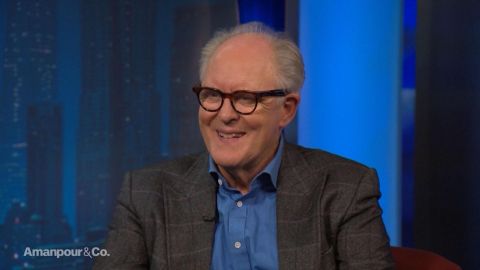Read Transcript EXPAND
CHRISTIANE AMANPOUR: The actor John Lithgow has racked up all kinds of awards, Emmy’s, Tony’s, you may know him from 3rd Rock from the Sun or Dexter. And soon, you’ll see him portraying the man who reshaped American media and politics before his long history of alleged sexual harassment caught up with him, Fox News chairman, Roger Ailes. Lithgow plays him in the new film “Bombshell” which has raised some early Oscar buzz. He’s also turned his talents to writing and he’s out with a satirical poetry collection, “Dumpty: The Age of Trump in Verse,” which chronicles the last few ruckus years in American politics. Why this departure? He tells our Hari Sreenivasan.
(BEGIN VIDEOTAPE)
HARI SREENIVASAN: Let’s start with the book, it’s called “Dumpty.” Why write it?
JOHN LITHGOW, AMERICAN ACTOR: Well, it was quite a surprise to me. It was a bright idea that it actually grew out of a performance I gave at a New York public theater gala in Central Park a few years ago. They asked me to sing the major general song from Pirates of Penzance as an entertainment, and I said, sure, but I’ll perform it in the character of Michael T. Flynn. And I’ll rewrite the final verse. I’ve dressed up, make-up and hair and wig of Michael T. Flynn and launched into the third verse, took the audience completely by surprised. When President Obama made me head of all things clandestine, he realized he’d brought to life a governmental Frankenstein, etc. And it killed — the audience was so surprised and they found it so hilarious and I shared that with my literary agent, not with a view to a book idea. He is the one who said, there’s your book. And he said, I could sell this tomorrow. So I said — he said —
SREENIVASAN: To half the country. What about the other half?
LITHGOW: Well, good lord, that’s a lot more than what — that’s a bigger percentage than most books of any kind.
SREENIVASAN: Let me start by having you read just the first one that kind of sets the tone for the whole book.
LITHGOW: All right. This sort of explains the title as if it needed explaining. It’s called “Trumpy Dumty.” Trumpty Dumpty wanted a wall just a rabid political brawl, his Republican rivals both feckless and stodgy succumb in the end to his rank demagogy. Dumpty’s wall made no earthly sense a boondoggle built an enormous expense, but he promised in speeches despotic and shrill, he’d make certain that Mexico foot at the bill. Trumpty Dumpty kept insisting more and more citizens started resisting. Sadly, there won’t be an end to this tale, at least until reasonable people prevail. That’s a poem that, more or less, declares my bias. I’ve seen it as an introductory.
SREENIVASAN: Yes. How did you — how did you write these? Because some of these — or actually most of these are responding to events as really they unfold.
LITHGOW: Yes. Well, that’s kind of — it’s roughly chronological between June of 2018 and April 1st, 2019 when my deadline hit. And I had to have all of them completed. That means that an awful a lot has happened since then. Things move so quickly in this day and age. It feels like a century ago.
SREENIVASAN: Yes.
LITHGOW: It immediately turned it into a piece of history and piece of political contemporary political commentary.
SREENIVASAN: You know, people are going to watch this and say, oh, Hollywood liberals. What can you expect? Of course, this is what the guy from Footloose has turned.
LITHGOW: Well, I’ve never — I haven’t turned. I’m an old — my parents were old FDR lefties and I grew up, as many of us, most of us do with my politics as a kind of birthright, but I just kept them to myself. I don’t think I’m surprising that many people. They probably know I’m a liberal.
SREENIVASAN: You can understand or can you understand how the president has appealed to half the country.
LITHGOW: Yes, it’s true. I mean — there is just different kinds of entertainment. I mean, I’ve been in a lot of things when I was on 3rd Rock from the Sun, it was certainly at that moment I’ve been doing sitcom on NBC, along came “Survivor.” The beginning of reality T.V. era. In no time, at all, more people were watching reality television and scripted television. And to me, it was like people were watching lousy television instead of expert television. The expert entertainers are losing their audience to just the chaos of reality T.V. It’s just a reality you live with as an entertainer. I just have my standards and my taste are completely different from the standards and tastes of a lot of people. And that goes for politics, too, obviously.
SREENIVASAN: There’s a reason stage performance where you got to read the words of President Trump in the Mueller report.
LITHGOW: I greatly appreciate you informing me that I am not under investigation — It was a bridge. It was beautifully edited into an hour 10 minutes piece of theater, really by every at Pulitzer and Tony playwright. It was simply run it through once and then performed it live streaming online about 15 actors, really good actors whoever was available here in New York. So there was Kevin Kline, and Annette Bening, Michael Shannon, and Jason Alexander. It was astonishing how much of the report was written in dialogue. So we were actually speaking the words of these people.
SREENIVASAN: Yes.
LITHGOW: And there was no tweaking reality. We were simply performing it.
SREENIVASAN: As you were performing, you just recently did Mayor Giuliani.
LITHGOW: Yes.
SREENIVASAN: So you’ve spoken the words of the president and also parodied —
LITHGOW: Yes. Spoken the words of fantastic comedy writers on the staff of the late show.
UNIDENTIFIED MALE: Mr. Mayor. Mr. Mayor, thank you for joining us.
UNIDENTIFIED MALE: Beat it.
UNIDENTIFIED MALE: I haven’t asked you anything yet.
UNIDENTIFIED MALE: I know, and your facts are all wrong, so.
LITHGOW: And it was — it was hilarious. We rehearsed for all of three minutes and just let it rip.
SREENIVASAN: What would ruddy say right now in this interview? How do you change your face or change your mannerisms or your voice? How do you do that?
LITHGOW: Well, as always, you have wonderful coconspirators. Your confederates. They did a great half hour of makeup. I brought my own teeth. They were actually my own teeth from Buckaroo Banzai from 38 years ago.
SREENIVASAN: Still fit.
LITHGOW: I looked everywhere for them and I found them, they still fit and they just simply painted them bright white with water based, some kind of water based shellac then wash right off.
SREENIVASAN: So once you get into costume, do you feel like you are whatever character?
LITHGOW: Yes. I was more like him than ever. And I was able to look right into the camera, because that’s where the teleprompter was. So it looked like I was concentrating deeply. I was only reading the words that roll by. Steven was over here asking me questions. And I just let it ripped, just this mad parody of him. You’ve got a movie coming out where you’re playing Roger Ailes. First, let’s take a look at the clip from that movie, a little part of the trailer.
LITHGOW: Mm-hmm.
UNIDENTIFIED FEMALE: I want to convince you that I belong on air, Mr. Ailes. I think I’d be freaking phenomenal on your network.
UNIDENTIFIED MALE: I could pluck you out and move you to the front of the line, but I need to know that you are loyal. I need you to find a way to prove it.
UNIDENTIFIED FEMALE: Do you know just got that door blocking his office.
UNIDENTIFIED FEMALE: Someone has to speak up, someone has to get mad.
SREENIVASAN: All fantastic actors, Charlize Theron, Nicole Kidman, Margot Robbie. What’s the key there? I mean, you’re under obviously makeup and so forth? But what’s the key to mimicking someone? How do you get their mannerisms? How do you study for it?
LITHGOW: Well, I found all that I could video of Roger which was not easy to see himself and might be seen that much. He liked his people to be seen. I was enormously helped by just all the physical things, the fat suit and the makeup. And this marvelous script by Charles Randolph. But you just — it’s an imagines of leap, just use my body and my voice. It’s all I have to work for with and just did my best to inhabit this man and make people briefly forget about what he was really like and just accept my version of it. If there is a trick, that’s as closest as I can come to describing him.
SREENIVASAN: You know, you’ve had this ability to hit people in different generations. There’s going to be a group of people who listen to this or watch this, and say, is that the guy whose voice is in “Shrek.” There is going to be people who grew up watching “3rd Rock from the Sun” and then there’s going to be someone that has sort of “Footloose” reference or the “Twilight Zone” movie. And these are all different — and then, of course, there’s people who might remember you from the stage in Broadway when you were coming up. It’s kind of rare to find people actually able to stay relevant in these different forms for a good chunk of their career. I mean, it is a hard business to stay on top of.
LITHGOW: It is. I mean, it’s the source of a lot of pride, the fact that I’m still around and still viable, more hirable than ever, turns out I have — I’ve finally grown into my role of that old man.
SREENIVASAN: So you’ve been training your whole life for this really.
LITHGOW: You know, I grew up in a theater family, and a unique theater family. My father created and produced Shakespeare festivals in the Midwest. I mean, talk about appealing to different camps through entertainment. We lived in about eight different places, we traveled around like gypsy wagon. I worked for my dad. I acted in 20 Shakespeare plays by the time I was 20 years old, mostly in small roles.
SREENIVASAN: Did you want to do that?
LITHGOW: Oh, I’ve loved it. I didn’t intend to be an actor. I was much more interested in being an artist, actually. But I went away to college and fell into the theater gang. And I was a seasoned actor already.
SREENIVASAN: Right.
LITHGOW: And it was when I was destined to do, no matter in spite of myself. But it was Shakespeare. Shakespeare was at the heart of what my father did. I knew Shakespeare much better than I knew Arthur Miller, or Eugene O’Neill, Tennessee Williams. They were a mystery to me.
SREENIVASAN: Yes.
LITHGOW: Even naturalistic acting or something. You know, I was used to yelling in the back row. We have an outdoor theater with no amplification. Shakespeare wrote for all different occasions and for many different audiences. The man who wrote Hamlet wrote Comedy of Errors. The man who wrote Macbeth wrote the Merry wives of Windsor. And then he mixed history plays with romantic comedies as you like it. That’s how I sort of back into this curious career, I think, is acting in many different forms.
SREENIVASAN: Yes.
LITHGOW: And I like making people laugh every bit as much as I make — I like making them cry or scream out in terror. It’s just — Shakespeare wrote gothic horror too. I did Pet Sematary last year, he wrote Titus Andronicus.
SREENIVASAN: So you’re really drawing back on the stuff that you learned really as a teenager.
LITHGOW: By osmosis. I never gave that much thought.
SREENIVASAN: Yes.
LITHGOW: But I played — you know, they were repertory. The plays that played in repertory. Five, six, seven plays in a summer season. So you’re playing in very different kind of play every night of the week. And in a sense that’s without ever calculating it. That’s what I’ve done, jumping from movies and T.V. and stage for one thing.
SREENIVASAN: Yes. So which are you doing to feed what? Do you do films between Broadway?
LITHGOW: Well, the top root for me is the theater. And I return to theater fairly regularly and often. There was a 14-year period when I was in L.A., when I did “3rd Rock from the Sun,” a lot of movie were — when I was not in New York theater at all. But then I came back and did M. Butterfly which is one of the great stage experience.
SREENIVASAN: BD Wong. Both of you were — had an amazing performances for that. What’s it like to take on a role like — I mean, Winston Churchill. I mean, you — everybody’s read about him, there’s plenty of people who played him in the past, and here you are. How do you redefine it? How do you do this justice?
LITHGOW: Yes. Well, you know, it’s a curious thing. It’s a big English production. And there’s one thing that’s very distinctive about the English theater tradition. No one is selfish about a role. When I went over to play Malvolio and it was Shakespeare company, there were three other Malvolios going on. Patrick Stewart, Stephen Fry, and Derek Jacob, it makes four in all in one season. Now, In America, you would sulk about that. But not in England. They all run to see each other’s performance, to see what they can use in there. When I did King Lear, there were like four King Lears in town. And when I did Churchill, there were Brian Cox was playing Churchill. Gary Oldman won the Oscar for Churchill. And there was — the great Michael Gambon. You know, you’re just philosophical. And think, well, I hope that mine is different. I had the advantage of being an extraordinary piece of material. Peter Morgan’s marvelous writing, acting with Claire Foy and Atkinson, Harriet Walter, and Stephen Dillane. All these great, great actors. There was also a wonderful point of view to the crown. It was about the crown and mainly it was about the queen. And it was about monarchy and the whole role of monarchy and government which is a large and unfathomable subject. Winston Churchill was a supporting player. I think that’s a great advantage particularly when you’re playing a famous person. I think the other actors sort of who played Churchill, they carried the burden of being the story. The same with Roger Ailes. Roger Ailes fits in just right into “Bombshell.” That is a movie about the women of Fox. And it’s about not just the three big stars, but about a dozen women and how all of them reacted and responded differently to a crisis at Fox. And I was the crisis.
SREENIVASAN: So do you ever get intimidated now? I mean, now that’s you’ve played such a wide range of roles and kinds of medium? I mean, when you read a script or when you read a project, what is it that you look for? Or what is it that you —
LITHGOW: You look for good writing. So much springs from good writing. And I’ve done some pieces that were just mediocre writing, if not bad. You do them for other reasons. Because there are people you want to work with or because you’re going to be paid a lot more money or because it’s time to do a big studio movie. I’ve always said, the only difficult acting is bad writing. You just somehow make it work for yourself.
SREENIVASAN: What did you call yourself at the end of — as the movie reel of your life kind of flashes before your eyes, what do you — what do you think? Is it, OK, I’m an artist, I’m an entertainer, I’m a painter, I’m a drawer?
LITHGOW: Well, at all those things, I’m a very good actor.
SREENIVASAN: There’s that.
LITHGOW: Yes. I am a dabbler for sure. I’m a dabbler as a poet. I don’t call myself a poet. I have too much respect for genuine poets who have — who write with their own blood, you know, who’s —
SREENIVASAN: You’re a rhymer —
LITHGOW: I’m a clown, really. I’m a smartass clown.
SREENIVASAN: John Lithgow, thanks so much.
LITHGOW: Really, such a pleasure, Hari.
About This Episode EXPAND
Former U.S. Secretary of Veterans Affairs David Shulkin joins Christiane Amanpour to discuss his experience inside the Trump administration. Mona Fawaz weighs in on Lebanese Prime Minister Saad Hariri’s resignation, and Juan Manuel Santos analyzes unrest in Latin America. Actor John Lithgow explains the origins of his satirical poetry collection “Dumpty: The Age of Trump in Verse.”
LEARN MORE



